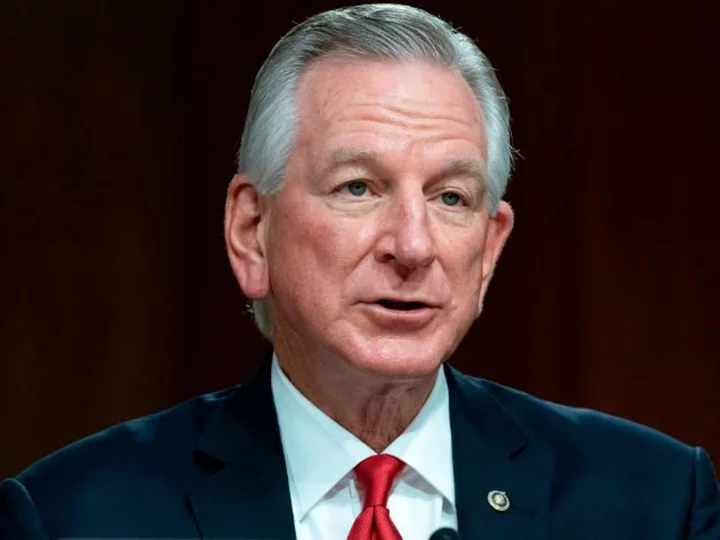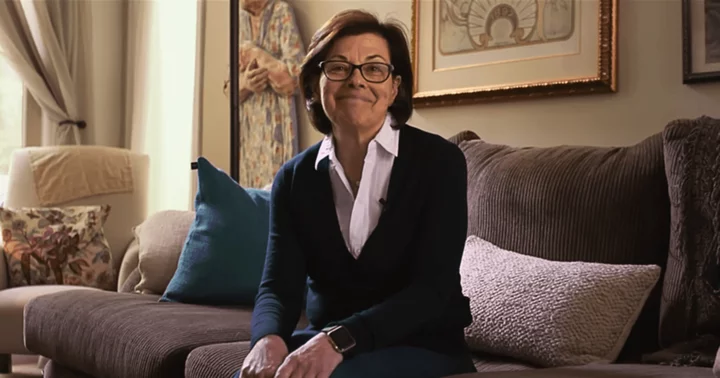If the last year of American politics, marked by the rise of anti-LGBTQ legislation, censorship in schools, and the dismantling of reproductive rights, were to be summed up in one word, new documentary Every Body makes the case that it should be "hypocrisy."
The call-to-action film, a June release from Focus Features and NBC News Studios, posits that the unspoken, voyeuristic, and abusive treatment of people who are intersex (an encompassing term for varying differences in sex traits or reproductive anatomy) should be prioritized on the galvanized lists of pro-autonomy activists fighting back.
SEE ALSO: 'It's our free space': How queer youth can protect their joy onlineEvery Body centers the stories of three vocal intersex advocates: producer, screenwriter, and actor River Gallo; writer and political consultant Alicia Roth Weigel; and PhD candidate, activist, and co-founder of the Intersex Justice Project Sean Saifa Wall. Their voices are helmed by director Julie Cohen (recognizable for the Academy Award-nominated documentary RBG) and producers like Shana Knizhnik, who is also intersex.
The movie is a blend of various personal stories, modern scenes, and historical lessons all meant to evoke the complexity of the intersex community itself.
Decades of medical and social abuse
Roth Weigel's initial introduction, focused on the secrecy ascribed to her as a child among her family and its impact on her dating life, moves into a story about political bravery and advocacy in the face of Texas legislators as a political ingénue.
Gallo weighs the layered oppressions of immigrant families in their home state of New Jersey with their desire to make transformative art as one of the only out intersex stars in Hollywood, as well as the impounding pressures of being both activist and artist.
"As intersex people, we're used to being objectified, to being a body and having doctors be spectators that look at our body — this experiment," Gallo told Mashable. "It's kind of a brilliant little configuration that I created for myself. Being an actor, the gaze is on me. Being also a screenwriter and a filmmaker, that's allowing me to take back the power of that gaze."
Credit: Focus FeaturesWall contends with the loaded history of medical voyeurism, the responsive rise of intersex community activism by organizers in the 1990s, and the suggestion of an all-embracing "Intersex Utopia," while walking us through in his own journey of trauma and self-discovery.
At the same time, a juxtaposed fourth storyline comes in and out of view, telling the sobering history of a man named David Reimer, who was forcibly socialized as a girl in childhood following a medical mistake. Reimer's story is supposed to be a warning, that the normalization of genital surgeries and medically invasive procedures forced on intersex youth can have life-altering consequences, and that binary thinking is doing much more harm than good.
Needle drops act as bold transitions between all of these scenes, alongside montages of school photos, yearbook scans, and covers of songs like "Our Lips Are Sealed" by The Go-Go's.
Cohen also drops in archival footage of Dr. John Money, introduced to viewers as an infamous "sexologist," the scientific mind behind a midcentury rise of binary intersex treatment, and one of the film's unspoken antagonists. "The result is not, by any means, as dire as one expects," Money tells a captive audience after he explains genital surgeries that Roth Weigel earlier called forced castration. The film is not afraid to issue denunciations, also calling out current intersex treatments conducted by pediatric urologist Dr. Dix Poppas.
Watching it at an early screening in a New York City theater, people gasped. And then, at times, they laughed out loud. And later, as the black-and-white images returned, they gasped again.
But Cohen does this all intentionally, she says, her attempt to capture a few of the numerous stories of intersex people that form a kaleidoscope of various medical and social realities. Viewers can feel the film's attempt to balance the moments of pain and reflection with intersex joy, dancing, art, and music. Cohen even adds pronouns for each cast and crew member during an end-credits dance montage, presented as a visual cue of binary-breaking empowerment.
As the documentary makes known, variation is one of the many essences of the intersex experience, at least as the binary world has fashioned it.
"It comes from a larger philosophy of, when you're making a film and particularly when you're making a social issue documentary, making sure that it is entertaining," Cohen said in an interview with Mashable. "My view is that movies should be enjoyable to watch, even if you're learning a lot and there's big issues at stake and there's some past histories of trauma to work through and some fights that are being had. Ultimately, the audience isn't going to get those messages if they feel trapped in the theater. You want them to be having fun while they're watching a movie."
The community as experts of themselves
In an appeal to this engagement goal, Cohen chooses to align the three well-versed advocates and activists more closely to an unfamiliar viewer in some scenes, like in an early shot of Wall and Roth Weigel watching the details of Money and Reimer's story unfold (a key anchoring point of the film).
But that's merely a device buying the rest of the world time to catch up to what intersex people already know, the cast clarified.
"Nothing that happened was designed to come as a super big surprise," Cohen told Mashable, speaking to the care and attention the film team put into selecting already open intersex advocates and creating a filming environment that was comfortably intimate. "Seeing David Reimer speaking about himself in his own words was what we anticipated might be an emotional experience for the viewer of the film. We wanted to get a sense of the reaction from the people in the film, for whom this story is not only as painful as it is for anyone to watch, but kind of has personal relevance."
The film, it should be made clear, intentionally centers vocally prominent leaders — experts and intersex historians, in their own right — among a community forced into staying silent or standing up for themselves when no one else would.
"The David Reimer piece is more helpful for outside people who have less context on intersex people," Roth Weigel added, "because it gives them a framework to even understand what our movement is. For us, we are very well acquainted with what we're fighting for."
Credit: Matt Nadler / Focus FeaturesWatching the film from one, surface perspective, then, is to get a 92-minute recap of the last 70 years of intersex medical history and a crash course in the community's activism — a perfect introductory watch in honor of Pride month. But viewing it through a different lens is to consider who exactly is the expert in conversations of medical abuse and historic erasure.
"For any marginalized person in Hollywood that is trying to create their own stories and films," Gallo said, reflecting on the art of filmmaking, "the biggest thing you can do is use the conventions of what Hollywood stories have created to tell those narratives — spin it on the audience and just fuck with them honestly. That's what my angle is, what I'm trying to do, and the way I'm trying to take my power back as an intersex person."
This angle is also the reason why the film devotes a section of its screen time to political advocacy, a later-third plotline that notes just how little has changed for intersex medical treatments — and the agendas of some American politicians — in the decades since forced adherence to a gender binary became the standard.
The realities of a restrictive binary
In 2013, the United Nations called for an end to "genital-normalizing surgeries" for intersex youth. In 2017, international human rights organization Human Rights Watch and intersex youth advocacy group interACT published a 160-page-long report exploring the physical and psychological damage caused by medically unnecessary surgery on intersex youth.
U.S. legislatures have been slow to respond to the international criticism, frequently debating bills that would ban pediatric intersex surgeries, without following through on action. In 2021, California came close to being the first to ban the procedures on children under 6 years old, but the bill was pulled in 2022.
Meanwhile, according to reporting by the 19th News, "more than two-thirds of the bills introduced this year that would ban gender-affirming care for transgender youth have specific intersex exemptions. The controversial exemptions allow doctors to assign minors who are born with secondary sex characteristics as 'male' or 'female' through surgeries, hormones or other interventions."
Want more Social Good stories in your inbox? Sign up for Mashable's Top Stories newsletter today.
The film's subjects talk about this striking double standard — that trans youth can't receive lifesaving treatment for a medically diagnosable condition, while intersex youth are forced to undergo harmful procedures — and they join others on the streets and in front of clinics to directly confront the politicians and physicians engaged in these outdated practices.
"It doesn't surprise me that the people historically, and at present, who fight for justice are the ones most impacted by state violence," Wall told Mashable.
The film's promotion also includes a hefty list of intersex advocacy and support organizations, part of its understandably not-so-subtle ask for acknowledgment, and a demand that intersectional activism include the work of intersex communities. The organizations include:
InterConnect (formerly AIS-DSD Support Group of North America)
The American Association for Klinefelter Syndrome Information and Support
Fighting Eating Disorders in Underrepresented Populations (FEDUP)
Genetic.org: The Association for X and Y Chromosome Variations (47XXY/Klinefelters)
"Really what it boils down to is giving us a platform," Roth Weigel said. "You hear our message and it doesn't just clear up things about our own community, but it clears up a lot of questions people have about other issues related to us as well."
Celebration of the intersex community grows louder
"As a co-founder of the Intersex Justice Project," Wall added, "I ask, 'How can intersex issues be in conversation with other movements? How can intersex issues be taken up by Black liberation movements? By reproductive justice? By climate change or environmental activism? How can other movements be informed by intersex justice, and how can intersex justice inform other movements?' I feel like I'm really interested in nurturing a very symbiotic conversation that keeps these issues in tension but also keeps dialogue open, because I know intersex issues have existed in a silo for a long time."
Every Body is one of just a handful of intersex-centered stories that have made it to the big screen, including two 2023 SXSW debuts, the documentary Who I Am Not and the coming-of-age story Bloody Hell. And while Every Body's June 30 theater release sets it at the tail-end of annual Pride month celebrations, the decades-long history it portrays extends far beyond this social spotlight, a segment of the American reality that needs to be told more often, the creators assert.
"The intersex community is vastly underfunded and underrepresented in terms of global identities," Roth Weigel told Mashable. "We receive less than one percent of all LGBTQIA+ funding for organizations and work, and not even broader activist work but within the LGBT community. We receive less than one percent of all that funding." She also noted that Cohen's 2023 take is one of the first times Hollywood has made a feature-length commitment to presenting the movement's history.
It's a belated move, but a sign that things may be changing. Every Body's mainstream release can be read as a show of faith that the full scope of the LGBTQIA community will soon be included in a full spectrum of rights advocacy and conversations about reform. The film itself may act as a barometer and guide for a more expanded personal politics that goes beyond topical calls to action and trending news. And it's a reminder that the fight for bodily autonomy is much bigger than one may realize.









